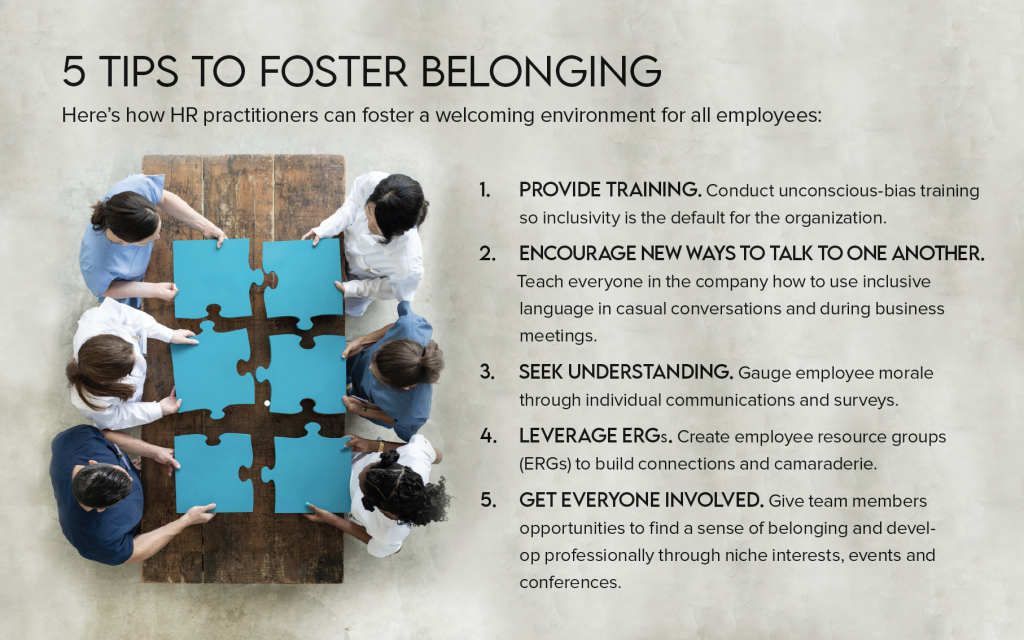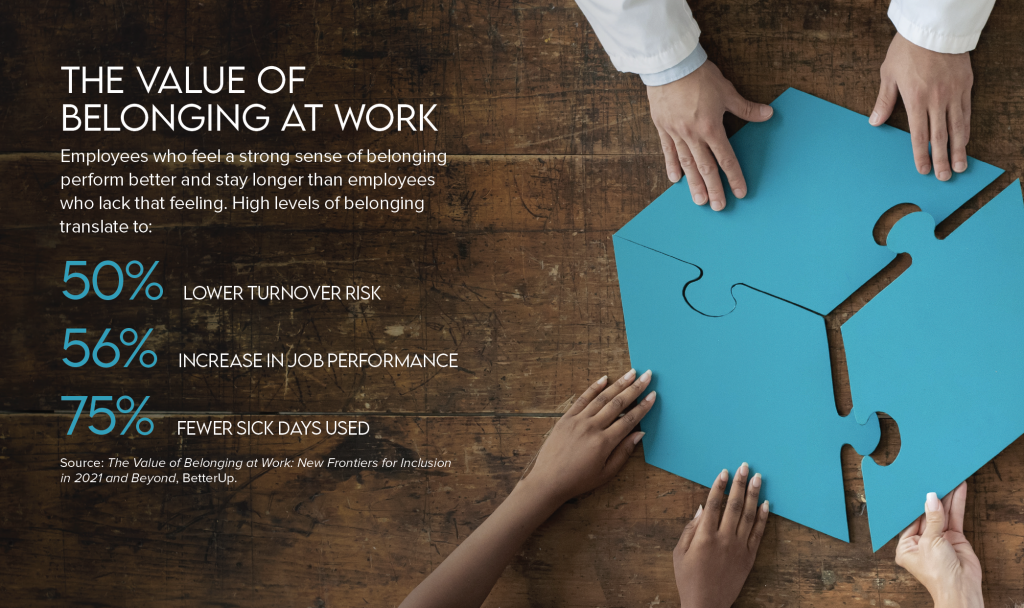- May 8, 2023
When employees feel comfortable bringing their authentic selves to work, companies thrive culturally and financially.
By Matt Gonzales | March 13, 2023
Jahanzaib Ansari knows about being an outsider at work.
Ansari, 33, has stuttered for most of his life. Years of speech therapy have helped him learn to manage his symptoms so they don’t interfere with his ability to excel at work. But that hasn’t prevented companies from subtly discriminating against him, he says.
For years, managers would finish Ansari’s sentences for him to speed up the conversation. During key presentations, they often zoned out when he was speaking. His good work and perseverance were overlooked, and he lost out on promotions to lesser-qualified candidates who spoke more fluidly.
“I haven’t been part of many companies that made me feel like I belonged,” says Ansari, who co-founded Toronto-based software firm Knockri in 2016.
Geri Johnson, 48, can relate. In previous roles, she was invited to work-related activities and meetings, but she rarely enjoyed them and managers never tried to learn more about her background and interests. This led her to feel isolated at times.
She craved human connection at work, but it didn’t come.
“I’m sure it wasn’t intentional, but always doing what they wanted to do never made me feel like I belonged,” says Johnson, who now is chief operating officer of public relations firm Next PR in Colorado Springs, Colo. “I have never felt like I belonged at any company.”
That feeling can drag down employees—and companies. Research has shown that lacking a sense of belonging at work can be more distressing to employees than being harassed. An environment where workers feel uncomfortable being themselves can create trust issues, diminish employees’ self-worth and erode workplace culture.
In fact, lack of belonging is a top driver contributing to the Great Resignation, according to research by McKinsey & Co. As businesses scramble to attract and retain talent, some have even added the term “belonging” to their diversity, equity and inclusion lexicon, turning DE&I agendas into DEI&B initiatives.
And that “B” is just as important to a healthy workplace environment as the other letters, according to Martha Jensen, chief people officer for software platform Sauce Labs in San Francisco.
“It’s an essential step to self-esteem and, ultimately, self-actualization,” she says. “DE&I and other cultural efforts provide the space for someone to feel that belonging, to build those meaningful human connections.

Good for Business
Diversity refers to a workforce’s physical, mental and emotional differences. Equity involves intentional actions—policies, processes and procedures—that ensure all employees have the same opportunities to do their best work. Inclusion refers to intentional behaviors that involve everyone in a meaningful way.
Belonging takes DE&I a step further and examines how individuals feel as they engage with the rest of the organization. It is a mental and emotional state of feeling seen, valued and supported based on a person’s uniqueness.
“[Belonging] focuses on employee sentiment,” says Adam Weber, senior vice president of community for 15Five, a performance management platform based in San Francisco. “Does the employee feel like they have a voice? Do they feel valued and seen? Can they show up as their true selves and be supported? There are many factors regarding a company’s work environment that need to be considered for employees to have a true sense of belonging.”
A 2021 survey by the Society for Human Resource Management measured employees’ sense of belonging in the workplace. Among the workers surveyed:
- 25 percent reported not trusting their manager to treat them fairly.
- 26 percent did not feel emotionally safe at work.
- 27 percent said their workplace does not clearly provide opportunities for employees to openly discuss issues without fear of penalty, punishment or retaliation.
- 27 percent did not think their manager encourages a culture of open and transparent communication.
The report also revealed that Black workers were more likely than white workers to say their workplace discourages discussions about racial justice issues (45 percent versus 30 percent). Author and workplace advisor Christie Lindor wrote a 2018 article for Forbes saying that ignoring social justice can increase unconscious biases that could negatively affect a company’s culture and lead to a diminished sense of belonging for employees of color.
“Without a championed sense of belonging within a workforce, employees may feel hesitant to be authentic or may even fear being ostracized by their colleagues,” explains Monique McDonough, chief operational officer for employee experience platform Kazoo + WorkTango in Austin, Texas. “This is detrimental to a cohesive and inclusive organizational culture and directly inhibits an employee’s ability to do their best work.”
It is critical for employees to feel that they belong at work no matter how significantly their background, race, gender or values might differ from their peers’, McDonough stresses.
When employees do not feel heard or accepted for who they are, studies show, productivity decreases and innovation suffers. Both workers and companies are robbed of growth opportunities. In some cases, high employee turnover and toxic cultures result.
Being disconnected can also cause one’s mental health to decline. Depression, anxiety and suicide are often associated with a feeling of not belonging. These conditions can lead to social behaviors that interfere with a person’s ability to connect with others, creating a cycle of events that further weakens their sense of belonging and negatively affects work performance.
Conversely, a study by leadership development platform BetterUp indicated that belonging was linked to a 56 percent increase in job performance, a 50 percent drop in turnover risk and a 75 percent reduction in sick days. For a 10,000-person organization, this would result in annual savings of more than $52 million.
Young workers, who have become increasingly difficult to recruit and retain, place a high value on organizations that commit to DEI&B efforts, says Ola Snow, chief HR officer at Cardinal Health in Dublin, Ohio.
“[Generation Z workers] are actively paying attention to what companies have been saying over the years,” Snow says. “Attracting today’s top talent starts with culture, and today’s applicants are looking at companies, not jobs or positions, first when thinking about applying.”

Creating a Welcoming Environment
As someone with autism, Eric Ascher, 28, had trouble finding an employer that fully accepted him for who he was.
The Rockville, Md., resident was routinely mocked from childhood to adulthood for his neurodivergence, inability to maintain eye contact and lack of social skills. After excelling academically at Goucher College in Baltimore, he participated in several internships during which, he says, he was treated differently from others.
“They didn’t give me as many or as complicated assignments as they gave the other interns,” Ascher says. “At times, I have felt like managers underestimated what I was capable of because I am on the autism spectrum.”
That all changed when Ascher landed an internship with RespectAbility, a nonprofit in North Bethesda, Md. The organization fosters a welcoming environment for people with disabilities. For example, Ascher’s boss routinely e-mails him a to-do list of tasks to ensure that he’s completing assignments on time, an accommodation that meets his needs.
RespectAbility, he says, is fully invested in his success.
“At staff meetings, we open each meeting by giving shout-outs to other staff members, and it always feels great to be recognized and to recognize others,” Ascher explains. “Everyone on staff treats me—and everyone else on staff, for that matter—with respect.”
Many companies are finding new ways to increase their workforces’ sense of belonging. Some have created designated office areas for multi-faith worship, for example, while others simply encourage employees to take time off to support their families or attend to their own mental health needs to avoid burnout.
McDonough’s organization, Kazoo + WorkTango, launched Pride Voices—an initiative that creates space for LGBTQ employees to share stories and experiences about their personal journeys and identities.
The program has received rave reviews. A few employees have highlighted how Kazoo + WorkTango’s approach to DEI&B feels different from that of other places they have worked, McDonough says. Employees have also stated that they feel more comfortable sharing their authentic selves with colleagues, without fear of judgment or consequences.
“DE&I is about your organization’s approach and principles, while belonging tells you if it’s working,” McDonough explains. “Our Pride Voices initiative helped our leadership team hear directly from employees and let us know that our commitment to fostering a sense of belonging was working.”
Snow notes that employers must equip managers with the necessary skills and tools to talk with their subordinates about a variety of topics, both professional and personal. When an employee feels that they can’t have tough conversations with their manager, a culture of belonging can erode.
And it starts at the top. Business leaders must fully invest in forging a culture that adheres to DEI&B principles. Snow says it’s critical for CEOs to empower people managers, who can then better support their employees.
“A sense of belonging really comes down to whether or not you have the trust of your employees,” she says. “The key to building belonging and trust is feeling heard, and those who are promoting people-centric cultures must tune in, listen and follow up.”
Matt Gonzales is an online writer/editor for SHRM who focuses on diversity, equity and inclusion.
To view the original article posting, click here.

